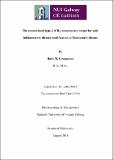The cannabinoid type-2 (CB2) receptor as a target for anti-inflammatory disease modification in Parkinson's disease

View/
Date
2016-08-04Author
Concannon, Ruth M.
Metadata
Show full item recordUsage
This item's downloads: 176 (view details)
Abstract
Parkinson’s disease is a multifaceted neurodegenerative disorder with no curative treatment. A key aspect in the pathogenesis of Parkinson’s disease is inflammation, which is initially triggered by dying neurons and which may form a self-sustaining cycle of neuroinflammation and neurodegeneration, ultimately propagating disease progression over time. As such, anti-inflammatory disease modification is an emerging field in the treatment of Parkinson’s disease. Because of its location on microglia and its immunosuppressant effect on these cells, the cannabinoid type-2 (CB2) receptor has been hypothesised as a potential anti-inflammatory target for this condition. Thus, the overarching aim of this body of research was to investigate expression of the CB2 receptor in preclinical models of Parkinson’s disease, and to determine if pharmacological targeting of this receptor could provide functional neuroprotection in these models.

